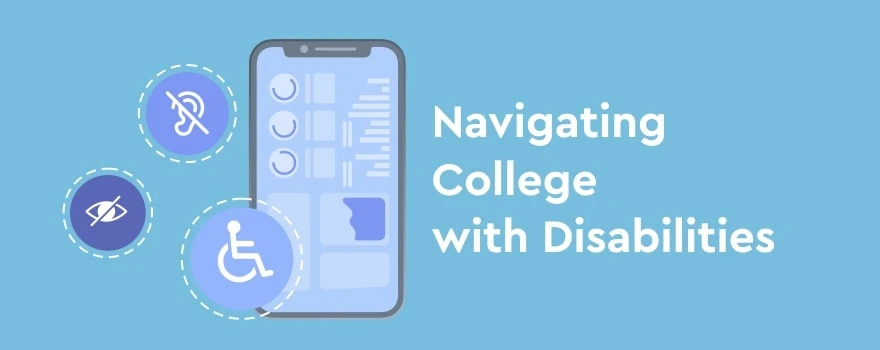Introduction
Embarking on the journey of higher education is an important milestone, filled with anticipation, challenges, and opportunities. For students with disabilities, this journey also involves navigating a unique set of considerations – from understanding legal rights to accessing appropriate accommodations and resources. This guide is designed to be your comprehensive companion throughout this journey.
In this guide, we delve into the essential aspects of college life for students with disabilities. Accessibility doesn't just stop at physical or digital adaptations; it extends into inclusive campus life, support networks, and health and wellness.
Technology plays a pivotal role in enhancing learning experiences and accessibility, and we present the latest assistive technologies and explain how to access them. We also understand the importance of looking ahead, which is why we have included sections on career preparation and internships, offering guidance on confidently transitioning to the professional world.
Recognizing the significant role of family support, we also provide insights for parents to effectively support their college students while fostering independence.
This guide is more than just information; it's a source of empowerment, designed to equip you with the tools and knowledge to successfully navigate your college years. Whether you're a student, parent, educator, or ally, this guide aims to provide resources to make the college experience enriching and fulfilling for students with disabilities.
Join us as we explore college life, tailoring the journey to meet your unique needs and aspirations. Let's embark on this journey together, ensuring that your college experience is accessible, transformative, and rewarding.
Understanding Your Rights and Preparing for College
Beginning your college journey as a student with disabilities involves more than just academic preparation; it's also about advocating for your rights.
Legal Rights and Advocacy
Students with disabilities are protected under federal laws, such as the Americans with Disabilities Act (ADA) and Section 504 of the Rehabilitation Act. The ADA ensures equal opportunity for people with disabilities in public accommodations, employment, transportation, state and local government services, and education. Familiarize yourself with these rights through resources like the ADA National Network and the Office for Civil Rights.
Engaging with your college's disability services office is crucial. They can provide information on accommodations, assistive technologies, and additional support available on campus. For advocacy and support, organizations like the National Disability Rights Network offer resources and guidance on navigating the legal and educational landscapes.
Choosing the Right College
Selecting a college that meets your needs is crucial. Research prospective colleges' disability services and their accommodation offerings. CollegeBoard offers tools to help you find colleges with comprehensive disability services.
If possible, visit campuses to assess the environment. Virtual tours, available on most college websites, can be a practical alternative if in-person visits aren't feasible. Additionally, engaging with online forums such as College Confidential can provide insights from current students with disabilities.
Financial Aid and Scholarships for Students with Disabilities
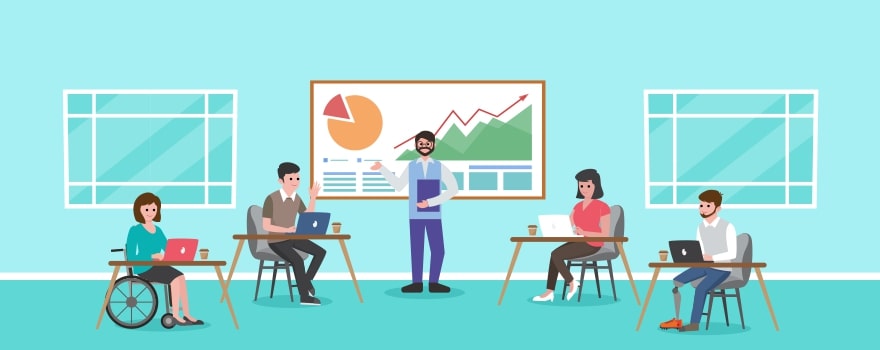
Navigating the financial aspect of college can be a daunting task, especially for students with disabilities. Understanding your options is crucial.
Scholarships and Grants
A variety of scholarships and grants are available to help students with disabilities cover the costs of their education. This financial aid is often based on the type of disability, academic achievement, or field of study.
- Disability-Specific Scholarships: Many organizations offer scholarships for specific disabilities. For instance, the National Federation of the Blind provides scholarships for visually impaired students. Similarly, the Hearing Loss Association of America offers financial aid to students with a hearing impairment.
- General Scholarships: There are also scholarships not limited to a specific disability. Websites like Disability Scholarships list various opportunities available for those with different disabilities.
- Grants from Government and Non-Governmental Organizations: Federal grants, like the Pell Grant, are available to all eligible students, including those with disabilities. Additionally, organizations such as the American Association on Health and Disability offer grants and scholarships to students pursuing a career in the health and disability sectors.
Exploring these options early and applying for multiple scholarships can increase your chances of receiving financial support.
Campus Accessibility and Accommodations
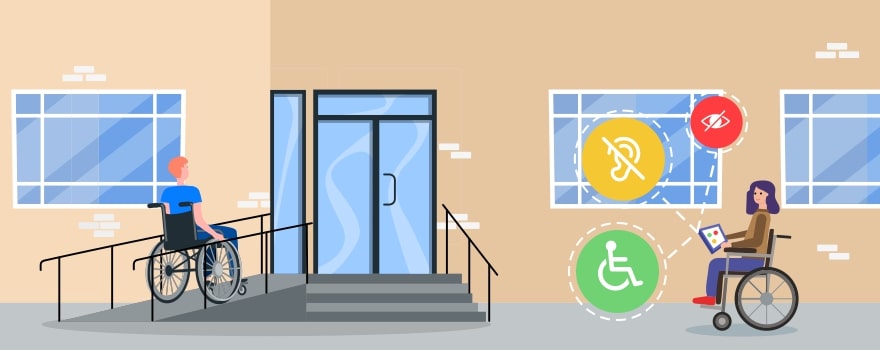
Ensuring an accessible and supportive educational environments is crucial for students with disabilities. Let’s take a look at the importance of both physical and digital accessibility on campus as we highlight the various accommodations that can support your learning journey.
Navigating Physical and Digital Accessibility
Physical accessibility on campus includes barrier-free buildings, accessible dormitories, and tailored transportation services. If you plan to live on campus, it's important to communicate your needs with the college’s housing office well in advance. Resources like the Fair Housing Act provide guidance on housing rights for people with disabilities.
Digital accessibility is equally important, especially in an increasingly online world. This encompasses accessible websites, digital course materials, and assistive technologies like screen readers. The Web Content Accessibility Guidelines (WCAG) provided by the World Wide Web Consortium is a useful reference for understanding digital accessibility standards.
Academic Accommodations and Support
Academic accommodations for people with disabilities can include extended time for exams, note-taking assistance, and alternative formats for coursework. The Association on Higher Education And Disability offers resources to understand the range of accommodations available.
Support extends beyond just accommodations. Many colleges offer specialized tutoring, writing centers, and mental health services that prioritize the unique needs of students with disabilities. Using these resources can significantly enhance your academic success.
Participating in Campus Activities
Participating in campus activities is essential for a complete college experience. It allows for personal growth, skill development, and lasting friendships.
- Inclusive Events: Look for events that are inclusive and accessible. College event calendars and student affairs offices are good places to start.
- Advocacy and Involvement: Engage in advocacy groups or student government to make your campus more inclusive. The American Council on Education provides resources on student advocacy and leadership.
- Extracurricular Accessibility: Ensure that extracurricular activities, whether sports, arts, or academic clubs, are accessible. The Office of Civil Rights provides guidelines on accessibility for extracurricular activities.
Finding and Building a Support Network
A strong support network is invaluable for navigating the challenges of college life. This network can include peers, faculty, disability services staff, and campus organizations.
- Disability Services Office: As mentioned earlier, your first point of contact should be the campus disability services office. They can provide resources, information, and advocacy support. The National Center for College Students with Disabilities (NCCSD) website offers a comprehensive guide on taking advantage of disability services in college.
- Peer Support and Mentoring Programs: Many colleges have mentoring programs that match upperclassmen with freshmen with disabilities. These programs can offer guidance, support, and friendship. Engaging with organizations like the National Center For College Students With Disabilities can provide additional mentoring opportunities.
- Clubs and Organizations: Joining clubs and organizations can enhance your social network and enrich your college experience. Websites like CampusGroups can help you explore the options available on your campus.
- While these resources are useful for finding events that meet certain accessibility guidelines, don't be afraid to step outside your comfort zone and attend events that aren't listed on your university's accessible events calendar. One of the great things about college is that it empowers students to find new growth opportunities. Use resources to guide you toward accessible events while challenging yourself to look for other options.
Technology and Assistive Devices
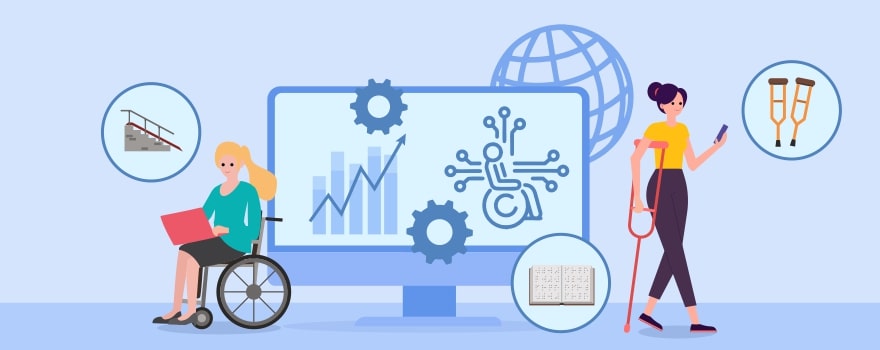
In the modern educational landscape, technology plays a pivotal role in leveling the playing field for students with disabilities. Let’s explore some of the latest assistive technologies available and how students can access these vital tools.
Latest Assistive Technology
Advancements in assistive technology have opened up new avenues for students with disabilities, offering tools that enhance learning and accessibility.
- Assistive Listening Devices: For students with a hearing impairment, devices like hearing loop systems or FM systems can be crucial in the classroom.
- Screen Reading Software: Visually impaired students can benefit from screen readers and text-to-speech software. Websites like the American Foundation for the Blind provide a list of available technology.
- Speech Recognition Software: This technology allows students with mobility or learning disabilities to use computers. Dragon Naturally Speaking is a popular example.
- Note-Taking Apps: Apps like Glean help students record and organize lecture notes effectively.
- Mobility Aids: Electric scooters or wheelchairs equipped with modern technology can enhance mobility on campus.
Accessing and Funding Assistive Devices
Accessing these technologies can be financially challenging, but there is help available.
- University Resources: Many universities offer assistive technologies through their disability services office. Inquire about available equipment and the process for accessing it.
- Grants and Scholarships: Look for grants and scholarships specifically for assistive technology. Organizations like the Assistive Technology Industry Association often provide information on funding sources.
- State and Federal Programs: State vocational rehabilitation agencies and federal programs can offer financial assistance for assistive devices. The U.S. Department of Labor's Office of Disability Employment Policy is a useful resource for finding these programs.
Overcoming Challenges
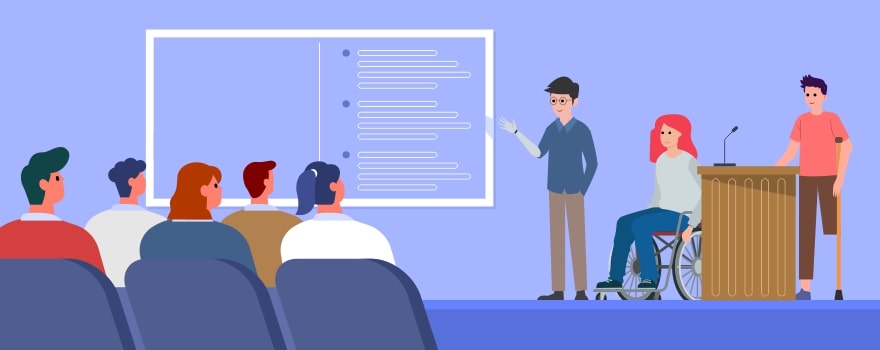
College life presents unique challenges, especially for students with disabilities. Understanding how to navigate these challenges and effectively advocate for yourself is crucial.
Overcoming Obstacles
Students with disabilities face various challenges, from physical barriers to personal biases. Overcoming these obstacles requires a combination of self-advocacy, resourcefulness, and resilience.
- Self-Advocacy: Learning to effectively communicate your needs and rights is vital. Resources like the Self Advocacy Resource and Technical Assistance Center can offer guidance and tools.
- Seeking Support: Don't hesitate to reach out to campus resources, such as disability services, counseling centers, or trusted faculty members, for assistance.
- Educating Peers and Faculty: Part of overcoming obstacles involves educating those around you about disabilities and the importance of accessibility and inclusivity. This can foster a more understanding and supportive campus environment.
Campus Safety for Students with Disabilities
Ensuring safety on campus involves understanding the specific needs of students with disabilities, especially during emergencies.
- Knowledge of Safety Protocols: Learn about your college's emergency procedures and how they address students with disabilities. This includes evacuation plans, sheltering procedures, and emergency communication methods.
- Personal Emergency Plans: Develop a personalized emergency plan that addresses your specific needs. This might involve coordinating with campus disability services and safety offices. The Red Cross offers guidelines on creating personal emergency plans for those with disabilities.
- Accessibility of Safety Services: Ensure that safety services, such as campus police and emergency medical assistance, are accessible and equipped to handle the needs of students with disabilities.
Emergency preparedness and safety are critical components of the college experience. By being informed and understanding the resources available, students with disabilities can navigate their college experience with greater confidence and security.
Parental Guidance and Involvement
As students with disabilities embark on their college journey, parents are crucial in providing support and fostering independence. This section explores how parents can effectively guide and support their children.
Role of Parents
- Preparing for the Transition: Understanding the shift from high school to college is vital. Foster your child's independence and decision-making skills. This infographic offers valuable insights into this transition.
- Learning About College Resources: Familiarize yourself with the resources your child's college offers, especially those pertaining to disability support. Helping your child understand and utilize these resources is immensely beneficial.
- Communication and Independence: Keep communication lines open, but allow your child to take the lead in interactions with college staff. This approach fosters independence and builds self-advocacy skills.
In the college journey, the role of parents shifts from direct involvement to one of guidance and encouragement. By reaching this balance, parents support their children's academic endeavors and lay the groundwork for their independence and success.
Health, Wellness, and Self-Care
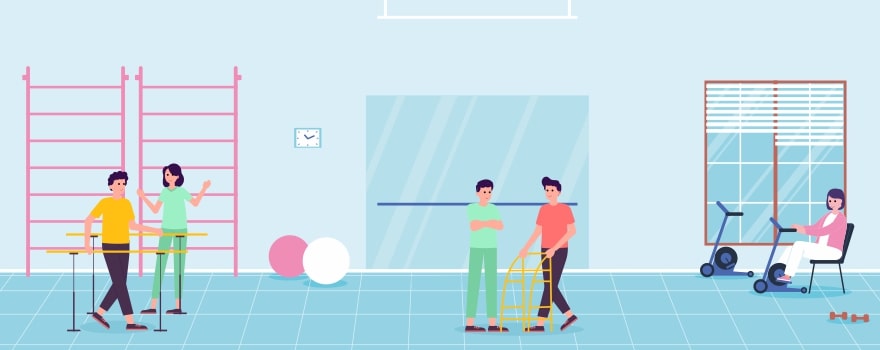
Health, wellness, and self-care are essential for all college students, but they can present unique challenges for those with disabilities. It’s crucial that students with disabilities be familiar with the tools and resources available to them.
Mental Health Resources
Mental health is a critical component of overall well-being, especially for students adjusting to the demands and stresses of college life.
- Counseling Services: Most colleges offer counseling and mental health services. It's important for students with disabilities to be aware of these resources and feel comfortable accessing them. The Active Minds website provides information on mental health advocacy and support on college campuses.
- Peer Support and Groups: Many colleges have peer support groups for students with disabilities, which can be a great source of emotional support and camaraderie.
- Stress Management and Self-Care: Learning and practicing stress management techniques and self-care routines is vital. Resources like the Jed Foundation offer strategies specifically tailored to college students.
Physical Health and Accessibility
Physical health and accessibility are equally important, especially for students with disabilities or chronic health conditions.
- Health Services and Accommodations: Familiarize yourself with the health services your college provides and how they accommodate students with disabilities. This might include special medical equipment, accessible health facilities, or medical personnel.
- Fitness and Recreation: Participating in physical activities adapted to your needs can significantly improve your overall health. The National Center on Health, Physical Activity and Disability offers guidelines and resources for fitness and recreation.
- Nutrition and Diet: Maintaining a balanced diet is crucial. Many college dining services can accommodate special dietary needs, so it's important to communicate your requirements.
Access to health and wellness resources is a key factor in the success and well-being of students with disabilities. College can be demanding, and maintaining both mental and physical health is essential for a fulfilling college experience. In addition to fostering a healthy mind and body to succeed on campus, establishing the right habits is crucial for success post-graduation.
Career Preparation and Internships
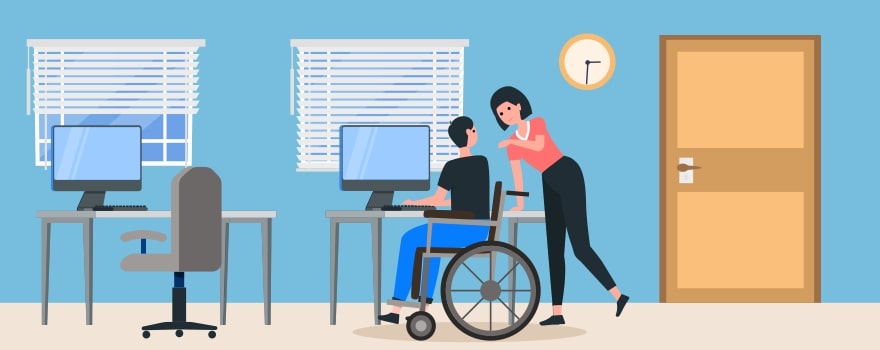
Preparing for a career and gaining practical experience through internships is an integral part of the college experience for all students. However, those with disabilities may encounter more obstacles.
Career Services for Students with Disabilities
Career services play a crucial role in helping students with disabilities prepare for their careers.
- Career Centers: Take advantage of the career counseling and planning services offered at your college. They can provide tailored advice, resume-building workshops, and job interview preparation. The National Association of Colleges and Employers offers resources and tips on career development.
- Networking and Career Fairs: Engage in networking events and career fairs, which are valuable opportunities to connect with employers. Ensure these events are accessible and ask for accommodations if needed.
- Internship Opportunities: Seek internships that provide practical experience and align with your career goals. Websites like Disability:IN can help you find internship opportunities aimed at students with disabilities.
Internship Opportunities and Accommodations
Internships are vital for gaining real-world experience and enhancing skills.
- Finding Accessible Internships: Look for internships that offer the necessary accommodations to support your disability. Resources like the Workforce Recruitment Program connect students with disabilities to employers seeking to diversify their workforce.
- Understanding Your Rights: Familiarize yourself with your rights as an intern, especially regarding accommodations in the workplace. The U.S. Equal Employment Opportunity Commission provides guidance on your rights under the Americans with Disabilities Act.
- Building Professional Skills: Internships provide an opportunity to build skills, gain confidence, and understand the dynamics of a professional environment. Embrace these experiences as stepping stones to your future career.
Conclusion

Throughout this guide, we've explored various aspects that are crucial to a successful college experience for students with disabilities. From understanding legal rights and preparing for college to accessing financial aid and embracing technology, each section provides valuable resources and advice. We emphasize the importance of an inclusive campus life, the necessity of emergency preparation, and the invaluable role parents play in supporting their children. The focus on health, wellness, and self-care, alongside preparing for future careers and internships, underlines the holistic approach required for a fulfilling college journey.
Remember, college is not just an academic endeavor, but also a comprehensive experience that shapes your future. As a student with disabilities, you have the right to accessible education and the support needed to thrive. Utilize the resources available, you can advocate for your needs, and embrace your unique journey with confidence and determination.
References and Further Reading
Below is a list of references and reading materials mentioned in the guide, along with additional resources for further information and support.
ADA National Network
adata.org
Office for Civil Rights, U.S. Department of Education
www2.ed.gov/about/offices/list/ocr/index.html
National Disability Rights Network
ndrn.org
College Board
collegeboard.org
Self Advocacy Resource and Technical Assistance Center
selfadvocacyinfo.org
American Foundation for the Blind
afb.org
Dragon Naturally Speaking (Nuance Communications)
nuance.com/dragon
Glean (Note-taking App)
glean.co
American Association on Health and Disability
aahd.us
U.S. Department of Education’s Federal Student Aid
studentaid.gov
Mint Budgeting App
mint.com
Job Accommodation Network (JAN)
askjan.org
Web Content Accessibility Guidelines (WCAG), World Wide Web Consortium
w3.org/WAI/standards-guidelines/wcag
Association on Higher Education And Disability (AHEAD)
ahead.org
Active Minds
activeminds.org
The Jed Foundation
jedfoundation.org
National Center on Health, Physical Activity and Disability (NCHPAD)
nchpad.org
National Association of Colleges and Employers (NACE)
naceweb.org
Disability:IN
disabilityin.org
Workforce Recruitment Program
wrp.gov
U.S. Equal Employment Opportunity Commission (EEOC)
eeoc.gov
The Red Cross
redcross.org
Parent Toolkit
parenttoolkit.com
Making the Transition from High School to College
for Students with Disabilities
https:// sites.ed.gov/idea/files/transition-to-college-toolkit.pdf
National Center For College Students With Disabilities
nccsdonline.org
College Confidential
collegeconfidential.com
Assistive Technology Industry Association (ATIA)
atia.org
American Council on Education
acenet.edu


